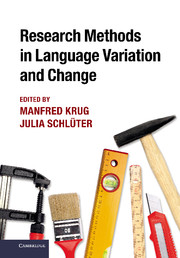22 - Computing linguistic distances between varieties
Published online by Cambridge University Press: 05 June 2014
Summary
Introducing rhoticity
In first-year undergraduate courses on English phonetics and phonology, or on varieties of English, one of the first distinctions introduced is between rhotic and non-rhotic varieties. Speakers of rhotic varieties produce some realization of /r/ everywhere <r> appears in the spelling, while speakers of non-rhotic varieties will do so only when /r/ is pre-vocalic. So, a non-rhotic speaker will pronounce /r/ in contexts like red, pretty, Erica, here it is, fearing; but not in tear, certain, here we are, fearful. As for the realization of /r/, this can vary widely, from an r-coloured schwa for many speakers of American English, to a uvular fricative for some older speakers of traditional varieties in the north east of England, though it is perhaps most commonly an alveolar or retroflex approximant.
Rhoticity has been investigated historically, sociolinguistically, and phonologically; it has figured centrally in studies from Labov (2006 [1st edn. 1966]) onwards, and has even had a special issue of a journal devoted to it (van de Velde and van Hout 2001). Speakers and hearers also seem very strongly aware of it as a marker of their own and of other accents, even though they may not have the linguistic terminology to describe very precisely what they are observing: so, for example, Emma on the BBC Voices website (www.bbc.co.uk/voices/yourvoice/accents_comments.shtml) notes that ‘I originally come from Leeds in West Yorkshire and speak with a West Yorkshire accent example: dropping my H’s and Vowels and not being able to pronounce my R’s properly’. More formal commentaries on accents also tend to highlight the question of rhoticity, as for example in the valuable notes provided on recordings on the British Library website, where Jim, a Lancashire speaker, is described as follows (www.bl.uk/learning/langlit/sounds/text-only/england/read):
Jim is clearly a speaker of traditional Lancashire dialect. Above all, he is a rhotic speaker – he pronounces the <r> sound after a vowel . . . In fact, this . . . remains very much a part of the English spoken in Scotland and Ireland. In present-day England, however, it is increasingly restricted to the West Country, the extreme South West and a rapidly shrinking area of Lancashire to the north of Manchester. In this part of Lancashire speakers might still differentiate between words such as paw, pour and poor, while in other parts of the country they are homophones.
Information
- Type
- Chapter
- Information
- Research Methods in Language Variation and Change , pp. 421 - 432Publisher: Cambridge University PressPrint publication year: 2013
References
Accessibility standard: Unknown
Why this information is here
This section outlines the accessibility features of this content - including support for screen readers, full keyboard navigation and high-contrast display options. This may not be relevant for you.Accessibility Information
- 2
- Cited by
